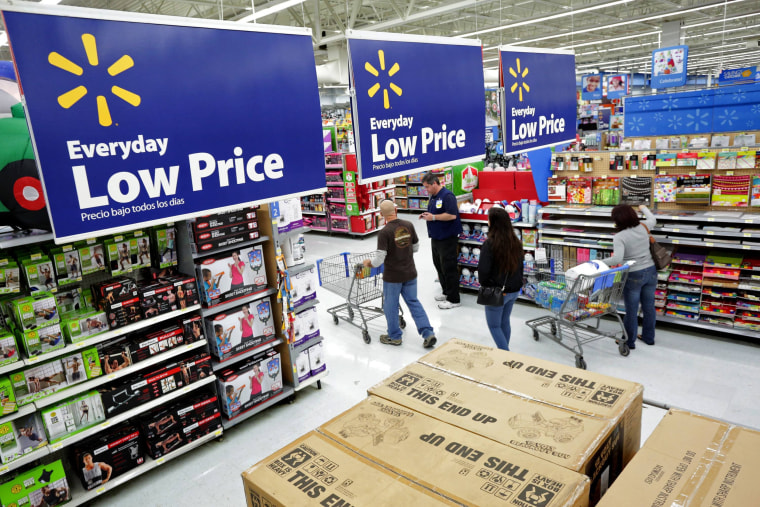Holiday shoppers want more than low prices. They want to know they’ve gotten the very lowest price. That’s why so many stores now have price matching policies and why some big name retailers have expanded their programs this holiday season.
Best Buy, Target and Wal-Mart stores will now match prices from some online competitors – including Amazon – and from their own websites. That’s a big change. In the past, most retailers excluded their own web prices from their price match policies – something that infuriated customers who couldn’t understand why.

Wal-Mart has become the leader in price matching. It will now match prices from 30 online sites – including Best Buy, Kohl’s, Sears, Target and Toys R Us – as well as prices on its own website.
“People are busy and they want to get in and out of the store and know that if they see a better price at another store, that it will be matched,” said John Forrest Ales, director of corporate communications at Wal-Mart.
Stores that price-match eCommerce sites hope to reduce “showrooming” – when someone comes into the store, checks out a product and then buys it online. They want to encourage shoppers to do what’s been dubbed “webrooming” – browse online and then make the purchase at the store.
“Retailers hate showrooming,” said Mark LoCastro, director of public relations at DealNews.com. “This year they are going to do everything possible to make sure you buy from them, whether it’s in their physical store or on their website.” (Deal News has compiled a Black Friday Price Matching Guide.)
Is price matching a marketing gimmick?
Price matching is a simple way for retailers to build confidence in their brand.
“It lets people feel good about the price they’re paying and not go and search for a lower price, so they feel more comfortable with the transaction,” said Barbara Kahn, a marketing professor at the University of Pennsylvania’s Wharton School of Business. “To offer this guarantee a store must have good prices, but they don’t have to have the lowest price on everything.”
Marshal Cohen, chief industry analyst at the NPD Group, is an expert on consumer behavior. He says customers like to shop where there’s a price-match guarantee, and retailers know most of them won’t bother to ask for a price adjustment.
“Shoppers want to know that the store offers it, but they don’t know how to go about asking for it,” Cohen told NBC News. “Very few people are versed in the skill to be able to ask for a discount or have the nerve to ask for one.”
Research done by the NDP Group indicates that only five percent of shoppers feel comfortable asking for a price match. During the holiday shopping season, when it’s all about the deal, that jumps to about 50 percent.
“If they get it great, if not, they may buy it anyway, just so they don’t have to go to another store,” Cohen said.
Know how to play the price-match game
If you do your homework, know the store’s policy and have the courage to ask, you may be able to use a store’s low-price guarantee to save some money on your holiday purchases.
Remember, price-match policies have limitations and qualifications. Find out what they are. Which competitors are covered? Does it include online retailers? Does it include the store’s own website? Is it limited to certain merchandise? Are there days – like Black Friday weekend or Cyber Monday – when the price match doesn’t apply? What proof will you need?
Edgar Dworsky, super shopper and founder of the website ConsumerWorld.org, cautions that some retailers make it difficult to get a price adjustment.
“At some stores, the sales clerks make you feel like it’s coming out of their own pocket,” Dworsky said. “They’re trying to protect the company from that bad consumer who wants to get a lower price.” (Dworsky has published his Top 10 Tips to Bag a Bargain on Black Friday Week.)
The way to win at the price-match game is to understand the rules and have legitimate proof of the competitor’s lower price – that means the original newspaper ad or circular.
Using screen shots of online ads to make your case could be harder this year after what happened at Wal-Mart last week. A few customers created fake web pages to scam Wal-Mart into selling them $400 video game machines for less than $100.
You can get around that by using your smartphone to check web prices while you’re at the store. Do a search with a site like Price Grabber, Shopzilla, Shopping.com, or Google Shopping. And don’t forget to check the site for the store you’re standing in – it could have a lower price. If you find a lower price anywhere, ask them to match it. You’ve got nothing to lose.
Sometimes you can get price adjustments after the sale
Price matching typically takes place at the time of sale. You need to have proof of that lower price before the transaction is completed. But some retailers offer a price adjustment for a limited time after the sale. Black Friday and Cyber Monday prices are typically excluded.
Another option is to use a credit card that offers price-protection coverage. If the price of the item you bought goes down at that store within a certain time period (typically 60 or 90 days), you can file a claim and the credit card company will refund the difference.
Herb Weisbaum is The ConsumerMan. Follow him on Facebook and Twitteror visit The ConsumerMan website.